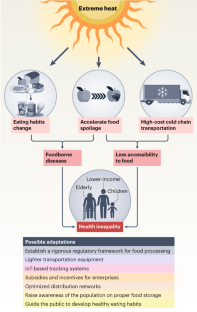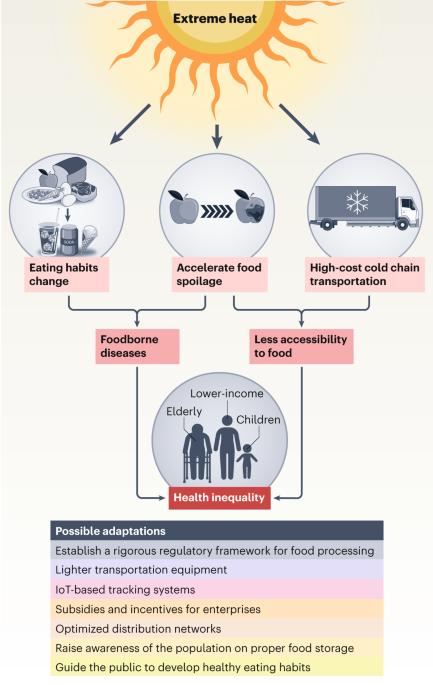极端高温威胁新鲜食品供应,严重加剧健康问题
IF 29.6
1区 地球科学
Q1 ENVIRONMENTAL SCIENCES
引用次数: 0
摘要
破纪录的气温给全球食品供应带来了重大风险,尤其危及新鲜农产品。必须紧急加强食品安全措施,包括重新评估食品生产的影响、改善冷链物流和调整饮食习惯,以确保食品系统和公众健康的恢复能力。本文章由计算机程序翻译,如有差异,请以英文原文为准。


Extreme heat disproportionately exacerbates health issues by threatening fresh food supply
Record-breaking temperatures pose critical risks to the global food supply, particularly endangering fresh produce. Urgent enhancements in food safety measures, including re-evaluating the impact of food production, improving cold chain logistics and adapting dietary practices, are required to ensure the resilience of food systems and public health.
求助全文
通过发布文献求助,成功后即可免费获取论文全文。
去求助
来源期刊

Nature Climate Change
ENVIRONMENTAL SCIENCES-METEOROLOGY & ATMOSPHERIC SCIENCES
CiteScore
40.30
自引率
1.60%
发文量
267
审稿时长
4-8 weeks
期刊介绍:
Nature Climate Change is dedicated to addressing the scientific challenge of understanding Earth's changing climate and its societal implications. As a monthly journal, it publishes significant and cutting-edge research on the nature, causes, and impacts of global climate change, as well as its implications for the economy, policy, and the world at large.
The journal publishes original research spanning the natural and social sciences, synthesizing interdisciplinary research to provide a comprehensive understanding of climate change. It upholds the high standards set by all Nature-branded journals, ensuring top-tier original research through a fair and rigorous review process, broad readership access, high standards of copy editing and production, rapid publication, and independence from academic societies and other vested interests.
Nature Climate Change serves as a platform for discussion among experts, publishing opinion, analysis, and review articles. It also features Research Highlights to highlight important developments in the field and original reporting from renowned science journalists in the form of feature articles.
Topics covered in the journal include adaptation, atmospheric science, ecology, economics, energy, impacts and vulnerability, mitigation, oceanography, policy, sociology, and sustainability, among others.
 求助内容:
求助内容: 应助结果提醒方式:
应助结果提醒方式:


